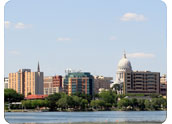WELCOME TO MILWAUKEE
The metropolitan Milwaukee region is a vibrant mix of urban neighborhoods, suburban cities, sprawling townships, and outlying rural counties. The city itself brings together a remarkable variety of cultures and nationalities to weave a rich fabric of traditions, customs, religions, and ideas. Bold, progressive, and beautiful, Milwaukee has invested $1.5 billion in premier facilities to attract tourism and convention traffic and is planning $1 billion in additional projects over the next few years. Improvements to Mitchell International Airport, Pier Wisconsin, the Public Market, and vibrant new commercial and entertainment centers are bringing new waves of energy into the city.
Services
Throughout the metropolitan region, residents enjoy easy access to quality educational resources on every academic level. Public and private educational resources combine to offer a wealth of opportunities in award-winning schools and internationally renowned institutions of higher education. Students of all ages can pursue a degree or certification as well as an affordable start on a four-year degree at a wide selection of community college campuses. A center for knowledge and research, the Milwaukee metro area is the sixth largest “college town” in the nation. The metropolitan area is home to 17 institutions of higher education that include highly respected four-year colleges, two major universities, specialty graduate institutions, two-year colleges, and several technical colleges. Some of the largest enrollments are at the University of Wisconsin-Milwaukee, the Milwaukee Area Technical College, Cardinal Stritch University, and Concordia University Milwaukee.
State-of-the-art healthcare services and facilities are ensured through a network of hospitals, medical centers, supportive centers, and clinics. When medical care is needed, professionals who are associated with nationally renowned facilities provide leading-edge services. Some of the outstanding resources in this region include exemplary healthcare systems, regional medical centers, long-term care facilities, skilled nursing, hospice, specialized care centers, and home-health options. Proactive and progressive health and wellness programs are available throughout the region, from fitness facilities to community education, support groups, and health screenings.

